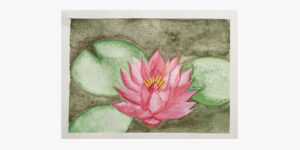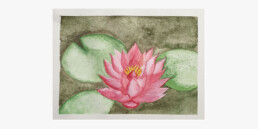A guest blog by Aini Butt.
‘Do you have the patience to wait till your mud settles and water is clear? Can you remain unmoving till the right action arises by itself?’ Lao Tzu
No.
I often lack this ability to be patient and I believe that I may not be the only one who struggles with this romanticised version of patience.
Stillness of the body does not always equate to stillness of the mind; it is during the silences that the inner voices are no longer drowned out, and their echoes may confuse you.
Passive listening will only add to the confusion and waiting for the inner storm to pass will not guarantee a relief either. It is during these times of emotional turmoil that motivational quotes are thrown around like toxic sprinkles of positivity only to add to the frustration.
This does not mean that there is no wisdom in these words. On the contrary! These pearls are of profound value; however, when taken out of their spiritual context they can feel like empty shells.
It was during another futile attempt at practising stillness of the mind that I decided to go for a run instead. During the run, I saw many muddy puddles and I thought of Buddha’s saying,
‘The lotus flower blooms most beautifully from the deepest, thickest mud.’
My mind wandered to the past when this quote was a stimulus for reflection and an art piece.

Running along the muddy trail, my mind also raced from one thought to another. Until a small muddy puddle stopped me in my tracks, literally.
‘Muddy water, let stand, becomes clear.’ Lao Tzu
This whole time I had been trying to run around the mud only to realise that even muddy puddles have the ability to reflect the vast sky if only you change your angle. The pictures below show both the puddle and the reflection captured from a different angle:

A slight change to my angles allowed me to reflect the cloudy sky within this muddy water.
It was like an epiphany, arguably a long overdue one. This is when it all made sense! The growing frustration during those enforced moments of stillness followed by shame; the painful gaslighting of one’s own emotions. Until some much-needed, yet temporary, relief of the ‘muddy’ phase followed by a repeat of the same emotional cycle.
Racing my mind back to my muddy puddle, a change of perspective allowed me to understand that it was not the emotion itself that made me feel frustrated. It was the passive state of mind followed by inaction, which meant that this whole cycle of emotions was repeated over and over again. This is when my mind turned to Rumi’s words,
‘These pains you feel are messengers. Listen to them.’
When you experience physical symptoms of an illness, you don’t just ‘listen’ to them; you are required to make active attempts at pinpointing the cause and deal with its roots. The emotional turmoil you face at times may put you through inexplainable pain, one that you fail to describe or share with others. It is during these moments that being still seems like the only way to see it through. Although this may provide temporary relief, chances are that another storm is on the forecast.
A passive state of stillness alone will not cure these pains. So why do you expect your emotions to fade away or settle by merely allowing yourself to feel them? Are you expecting the flood of your emotions to drown you, and somehow by remaining still you will miraculously resurface?
You shame yourself when the underlying emotions muddy your waters despite all your efforts to keep them neatly tucked away and plough through your days. You continue to tell yourself that their resurfacing will only create unnecessary upheaval and some things, including some emotions, are better left buried.
What if you changed your perspective? Just like I did to capture the reflection within the muddy water. Maybe it is time for you to change the way you look at your emotionally turbulent times and allow the subconscious emotion to float to the surface, allow it to muddy your waters until you cannot deny it anymore.
As Rumi said,
‘When someone beats a rug, the blows are not against the rug, but against the dust in it.’
In the same way, muddy waters serve a very important purpose. If you allowed the dust to settle back into the rug, the beating would have been of no use, similarly, passively waiting for your waters to become clear without appropriate action would be a missed opportunity for reflection upon the subconscious emotions.
The whole world has been made a source of reflection for you, even your muddy waters. Become a mirror to catch a glimpse of the depths of your emotions.


